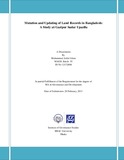Mutation and updating of land records in Bangladesh: a study at Gazipur sadar upazila

View/
Date
2013-02-28Publisher
BRAC UniversityAuthor
Islam, Muhammad ArifulMetadata
Show full item recordAbstract
The government of Bangladesh has taken some steps for strengthening and transforming the
public service to meet the need for a responsive and resilient public service that will meet
citizens’ specific needs, interests and demand. Issuance of a circular on mutation for land offices
is a step forward in this regard. In April 2010, the Ministry of Land issued the circular fixing
service process, time and fees of mutation of land records in land offices. According to the
direction of Ministry of land all Upazila/ circle land offices and union land offices are
implementing the circular. The main objective of the circular is to make land administration
more accountable, responsive, transparent, people friendly and to ensure quality of service
delivery in land offices. It aims to empower citizens by mentioning their rights, privileges and
duties. To examine the current situation of the circular’s implementation and identify the
problems in implementation of the circular, an upazila land office was selected as research area.
Both primary and secondary sources of data were used to get comprehensive picture of the
reality.
The researcher contacted different participants; officials, staff of land offices and citizens to
gather information. Besides, mutation case files and other secondary sources were examined to
collect data. Questions were formulated to explore the problems faced by the citizens as well as
the organization itself. The officers of AC Land office, staff, A.D.C (Revenue), D C and all the
citizens taking services from AC Land office were selected as population. The desired sample
size was 60. The sample was selected by purposive sampling technique. Of the 60 sample size 45
persons were from service receiver, 10 from service providers and 5 high level land officials of
the district including ADC (Revenue) and Deputy Commissioner of that district. So, 45 citizens
and 15 officers and staff were interviewed for that purpose. The qualitative and quantitative
analyses were followed to analyze the data synthetically and statistically.
The study found that, the implementation of the circular in upazila land offices is not
satisfactory. Service providers are not following the instructions of the circular and the people
even do not know about the circular. From the findings it is evident that even after two years of
its issuance the circular has not made any substantial dent on old colonial service delivery
mechanism. This attitude of service providers is weakening the effectiveness of the circular. On
the other hand, the citizens are totally ignorant of the circular and procedure. The complexity of
land management system, citizens unawareness, shortage of resources, conflicting rules and
regulations, colonial approach, lack of training, lack of freedom of opinion, workload, lack of
logistic support, corruption in land sector etc. are working as bar to implement the circular.
Those factors, therefore, are constraining the successful implementation of the circular in land
offices.
